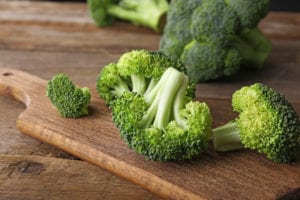Written by Jessica Patella, ND. This study strongly suggest that sulforaphane protects the gastrointestinal mucosa against oxidative injury induced by H. pylori and nonsteroidal anti- inflammatory drugs.
 Gastritis is the inflammation of the lining of the stomach that can lead to stomach or small intestine ulcers and ultimately increase the risk of stomach cancer 1,2. The two most common causes of ulcers and gastritis are infection with the bacteria H. pylori and side effects of non-steroidal anti-inflammatory drugs (NSAIDs) 1,2. Sulforaphane is an antioxidant found in broccoli sprouts that has been found to protect the gastric lining from injury caused by H. pylori or NSAIDs 1.
Gastritis is the inflammation of the lining of the stomach that can lead to stomach or small intestine ulcers and ultimately increase the risk of stomach cancer 1,2. The two most common causes of ulcers and gastritis are infection with the bacteria H. pylori and side effects of non-steroidal anti-inflammatory drugs (NSAIDs) 1,2. Sulforaphane is an antioxidant found in broccoli sprouts that has been found to protect the gastric lining from injury caused by H. pylori or NSAIDs 1.
The purpose of the recent research was to determine if oral intake of sulforaphane (SFN), the main constituent of broccoli sprouts, protected gastrointestinal (GI) mucosa against oxidative stress, H. pylori and side effects of NSAIDs. The research was conducted in multiple different ways, in vitro, in mice and in humans.
The findings were as follows:
In Vitro:
- H. pylori was grown in vitro and then SFN was applied at various doses in the culture. SFN showed antibacterial activity against H. pylori in vitro. (P<0.05 for both 50 & 100 SFN mg/mL compared to no SFN) 1.
In Mice:
- Gastric infections with H. pylori were established in 6-week old female mice. The mice were fed a high salt diet (7.5% NaCl) for 2-months to increase inflammation in the gastric mucosa. Mice were then divided into a No Broccoli Sprouts Group and a Broccoli Sprouts Group (3 micro mol/day). After 8-weeks on the broccoli sprout or non-sprout diet, all mice were sacrificed 1.
- Gastric mucosa was examined by light microscopy which found that mice fed broccoli sprouts showed less inflammation. The broccoli sprout diet resulted in an almost 2-log reduction in H. pylori colonization (P<0.05) 1.
In Humans:
- 50 H. pylori positive participants, whose endoscopy only showed gastritis, were randomized to broccoli sprouts (n=25) or alfalfa sprouts (n=25) which was the control since they do not contain sulforaphanes. Participants in the broccoli sprouts group consumed 70g/day of broccoli sprouts (rich in sulforaphane) for 8-weeks.
- Blood samples were taken to measure inflammation (pepsinogens I and II) and significant reductions were observed compared to baseline in the broccoli sprouts group only (P<0.05 for both pepsinogen I and II), indicating broccoli sprouts reduced gastric mucosa inflammation in humans 1.
- Stool samples for H. pylori were also significantly lower (P<0.05) in the broccoli sprout group during the 8-week intervention, but returned to baseline levels at 16-weeks. Indicating that broccoli sprouts need to be consumed consistently for results to be observed in reducing H. pylori infection 1.
In conclusion, broccoli sprouts were shown to reduce H. pylori infection and improve gastric mucosa. The researchers suggest SFN in broccoli sprouts protect the GI mucosa against NSAID induced oxidative stress.
Source: Yanaka, Akinori. “Role of sulforaphane in protection of gastrointestinal tract against H. pylori and NSAID-induced oxidative stress.” Current pharmaceutical design 23, no. 27 (2017): 4066-4075.
© 2017 Bentham Science Publishers
Posted April 23, 2019.
References:
- Yanaka A. Role of Sulforaphane in Protection of Gastrointestinal Tract Against H. pylori and NSAID-Induced Oxidative Stress. Curr Pharm Des. 2017;23(27):4066-4075.
- Sipponen P, Maaroos HI. Chronic gastritis. Scand J Gastroenterol. 2015;50(6):657-667.

